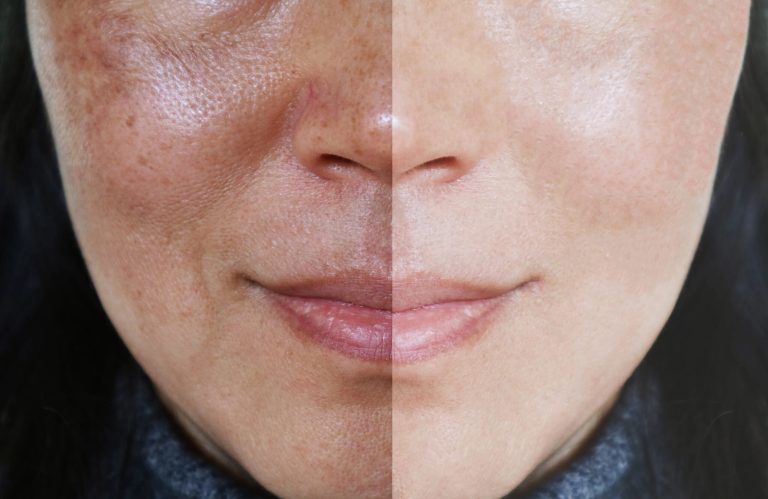Uneven skin tone is one of the most common skin concerns people face. Whether you’ve noticed darker spots, redness, or a patchy complexion, dealing with uneven skin tone can feel frustrating. Thankfully, achieving a flawless and balanced complexion is entirely possible with the right care and techniques. In this blog post, we’ll explore the causes of uneven skin tone and share effective tips and treatments to help you transform your skin from patchy to perfect.
Understanding the Causes of Uneven Skin Tone
Before you can effectively treat uneven skin tone, it’s important to understand the various factors that contribute to this condition. Uneven skin tone can result from:
- Hyperpigmentation: This refers to darkened areas on the skin caused by an excess production of melanin. Common types of hyperpigmentation include age spots, sunspots, and melasma.
- Sun Exposure: One of the leading causes of uneven skin tone is prolonged sun exposure. UV rays can damage the skin and trigger the production of melanin, leading to sunspots or uneven pigmentation.
- Hormonal Changes: Fluctuations in hormones, particularly during pregnancy, birth control use, or menopause, can cause uneven pigmentation. This condition, known as melasma, often appears as dark patches, typically on the forehead, cheeks, and upper lip.
- Acne Scarring: After acne outbreaks, the skin may heal with discoloration or scarring. These post-inflammatory marks can create a patchy appearance, especially if the acne was severe or not properly treated.
- Skin Irritation: Overuse of harsh skincare products, certain medications, or even environmental stressors can lead to redness and blotchiness, resulting in an uneven complexion.
Understanding the cause of your uneven skin tone is crucial because it will guide your treatment approach. With a deeper understanding of the problem, you can choose the most effective solutions for your skin.
Skincare Tips to Improve Uneven Skin Tone
Now that you know the causes, it’s time to dive into the practical steps you can take to balance out your skin tone. Here are some tips to help you achieve smoother, more even skin:
1. Wear Sunscreen Daily
One of the most important steps in tackling uneven skin tone is preventing further damage. Daily sunscreen application is crucial, even if you’re indoors. UV rays can penetrate windows, causing damage over time. Choose a broad-spectrum sunscreen with an SPF of 30 or higher. This will protect your skin from the harmful effects of the sun, including sunspots and pigmentation.
2. Exfoliate Regularly
Exfoliation helps to remove dead skin cells, which can contribute to dullness and a patchy complexion. Regular exfoliation can reveal brighter, more even skin by stimulating new cell turnover. You can use chemical exfoliants like AHAs (alpha hydroxy acids) or BHAs (beta hydroxy acids) or gentle physical exfoliants to polish the skin. However, avoid over-exfoliating, as this can irritate the skin and worsen discoloration.
3. Incorporate Brightening Ingredients
There are several skincare ingredients that target uneven skin tone and pigmentation. Here are some of the most effective ones:
- Vitamin C: Known for its brightening and antioxidant properties, vitamin C helps to lighten dark spots and boost overall skin radiance. Look for serums or moisturizers with stabilized vitamin C.
- Niacinamide: A powerful anti-inflammatory ingredient, niacinamide (or vitamin B3) helps reduce redness and even out pigmentation. It also supports the skin’s natural barrier, making it a gentle yet effective option for sensitive skin.
- Alpha Arbutin: A natural ingredient that helps to inhibit melanin production, alpha arbutin can lighten dark spots and even out skin tone without irritating the skin.
- Licorice Extract: This plant-derived ingredient has natural skin-brightening properties and can reduce the appearance of hyperpigmentation.
4. Consider Retinoids
Retinoids, which are derivatives of vitamin A, are one of the most effective ingredients for evening out skin tone. They increase cell turnover, helping to fade dark spots and acne scars over time. If you’re new to retinoids, start with a lower concentration to avoid irritation. These products should be used at night, as they can increase your skin’s sensitivity to the sun.
5. Hydrate and Nourish Your Skin
Hydration is essential for maintaining healthy, glowing skin. Dry skin can exacerbate the appearance of uneven skin tone and make dark spots look more prominent. Make sure to moisturize your skin daily with a hydrating cream or serum that suits your skin type. Look for products containing hyaluronic acid or glycerin, which help retain moisture and plump the skin.
6. Get Professional Treatments
If over-the-counter skincare products aren’t delivering the results you want, consider seeking professional treatments. Dermatologists offer various options for treating uneven skin tone, such as:
- Chemical Peels: These treatments use stronger acids to exfoliate the skin and improve pigmentation.
- Laser Treatments: Certain laser treatments, like fractional lasers or IPL (intense pulsed light), target dark spots and pigmentation issues by stimulating collagen production and breaking down melanin.
- Microneedling: This treatment involves the use of fine needles to promote collagen production, enhancing skin texture and tone while helping to diminish scarring and hyperpigmentation. For those in McMinnville, SRF microneedling offers a professional solution to address these concerns and rejuvenate your skin.
In Conclusion
Achieving a perfect, even skin tone doesn’t happen overnight, but with consistent effort and the right skincare routine, you can see noticeable improvement. Protect your skin with sunscreen, hydrate, and use targeted treatments like exfoliants and brightening ingredients to tackle uneven pigmentation. If necessary, seek professional treatments to speed up the process.
Remember, the key to tackling uneven skin tone is patience and consistency. Embrace the journey toward your best complexion yet!

